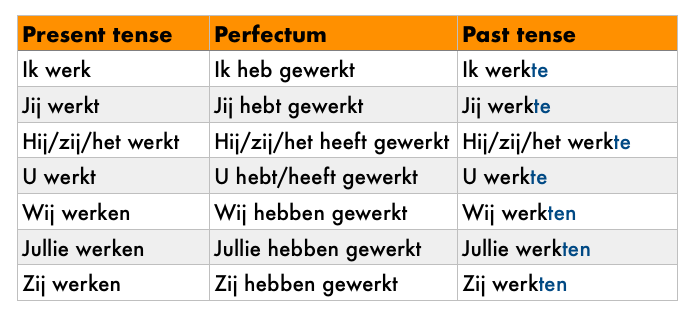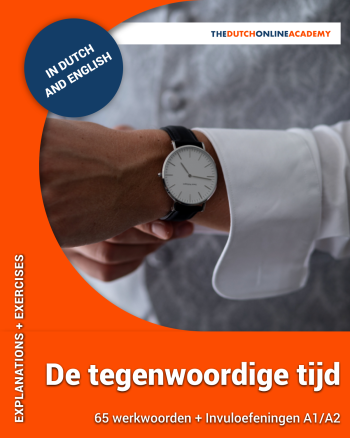Learn the theory
Regular verbs in Dutch past tense
Dutch imperfect tense / Dutch imperfectum
Like in every tense, the imperfectum has regular and irregular verbs. We start with the regular ones.

The verb werken is regular in all tenses as you can see in the table above. You can use PoCKeTFiSH or SoFTKeTCHuP to know whether a verb gets te(n) or de(n) in past tense. In the table below you find another regular verb ending in de(n). If you are not familiar with this concept, check our lesson on PoCKeTFiSH (see the link below this article).

Irregular verbs in Dutch past tense
Now let's take a look at the most common irregulars in singular and plural form. You will have to learn them by heart.
- zijn (to be)
- Ik was blij met het cadeau. Wij waren blij met het cadeau.
- hebben (to have)
- Ik had vroeger een kat. Wij hadden vroeger een kat.
- doen (to do)
- Hij deed niets. Jullie deden niets.
- krijgen (to receive, to get)
- Jij kreeg een compliment. Zij kregen complimenten.
- kijken (to look, to watch)
- Hij keek televisie. Jullie keken televisie.
- zien (to see)
- Zij zag een bijzondere vogel. Zij zagen een bijzondere vogel.
- kopen (to buy)
- Ik kocht een nieuwe telefoon. Wij kochten een nieuwe telefoon.
- denken (to think)
- Hij dacht aan haar. Zij dachten aan haar.
- schrijven (to write)
- Ik schreef een brief. Jullie schreven een brief.
- eten (to eat)
- Hij at een appel. Zij aten een appel.
- gaan (to go)
- Ik ging naar huis. Wij gingen naar huis.
- komen (to come)
- Jij kwam te laat. Zij kwamen te laat.
- worden (to become)
- Ik werd boos. Zij werden boos.
Practice with exercises
Fill in the right conjugation of the verb.
comments
Login to leave a comment


